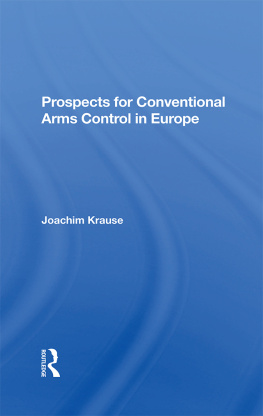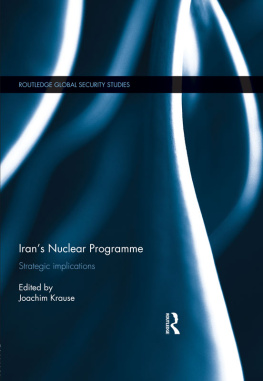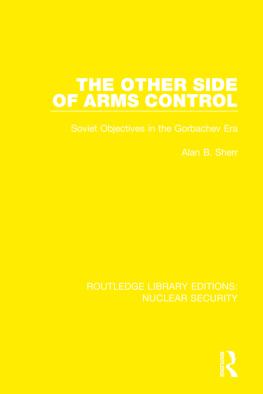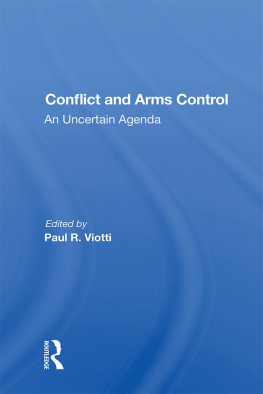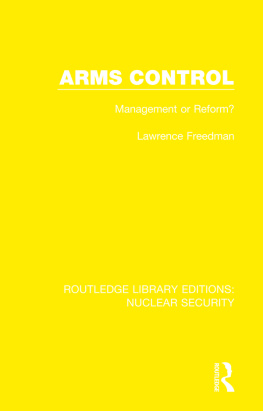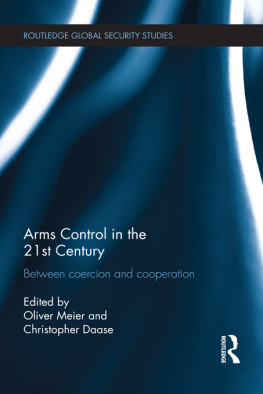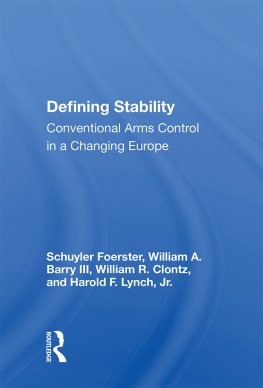Occasional Paper Series 8
Prospects for Conventional Arms Control in Europe
Joachim Krause
First published 1988 by Westview Press
Published 2019 by Routledge
52 Vanderbilt Avenue, New York, NY 10017
2 Park Square, Milton Park, Abingdon, Oxon OX14 4RN
Routledge is an imprint of the Taylor & Francis Group, an informa business
Copyright 1988 by the Institute for East-West Security Studies, Inc., New York.
All rights reserved. No part of this book may be reprinted or reproduced or utilised in any form or by any electronic, mechanical, or other means, now known or hereafter invented, including photocopying and recording, or in any information storage or retrieval system, without permission in writing from the publishers.
Notice:
Product or corporate names may be trademarks or registered trademarks, and are used only for identification and explanation without intent to infringe.
Library of Congress Cataloging-in-Publication Data
Krause, Joachim, 1951
Prospects for conventional arms control in Europe/by Joachim
Krause.
p. cm.(Occasional paper series; 8)
1. Arms control. 2. EuropeDefenses. I. Title. II. Series:
Occasional paper series (Institute for East-West Security Studies);
8.
JX1974.K813 1987 327.1'74dc 19 88-3663
ISBN 13: 978-0-367-28449-7 (hbk)
Over the past two decades conventional arms control has largely been overshadowed by the concern to control nuclear arms. In the coming years, however, issues related to conventional arms control are likely to become more pressing. The conclusion of an INF Treaty eliminating all medium- and short-range missiles in Europe has changed the strategic environment in Europe and made more urgent the need to address current asymmetries in the conventional area. Concurrently, the Soviet Union has begun to show a new interest in conventional arms control and has put forward a number of proposals and ideas which begin to address long-standing Western concerns. In addition, East and West are currently about to begin new negotiations, the Conventional Stability Talks (CST), on conventional arms from the Atlantic to the Urals. The mandate for these new talks will go considerably beyond that of the Mutual and Balanced Force Reduction (MBFR) talks and focus on ways to enhance conventional stability. These new talks open up new prospects for avoiding some of the key problems that inhibited progress in MBFR. For all these reasons conventional arms control will occupy a more important place in East-West relations in the future.
Dr. Joachim Krause, a Research Associate at the Institute for Science and Policy in Ebenhausen, Federal Republic of Germany, and a Resident Fellow at the Institute for East-West Security Studies in 1986-1987, addresses this vital and timely issue in detail in this study. Taking into account the signs of change in the Soviet approach to the conventional force balance in Europe, Krause examines recent Western and Eastern conventional arms proposals from the viewpoint of their contribution to strengthening stability in central Europe, the focal point of the East-West confrontation. His conclusion, that asymmetrical reductions by the Warsaw Treaty nations are a prerequisite to a meaningful conventional arms control process in Europe, may not be accepted by all parties to the issue, but his analysis of the structural obstacles to progress in this field deserves to be taken seriously.
Joachim Krause wrote this essay while he was a Resident Fellow at IEWSS in 1986-1987, where the paper was exposed to the critical review of an East-West team of foreign policy and security specialists. The author wishes to express his thanks to the Resident Fellows of the Institute for 1986-1987, especially Andrzej Karkoszka and Ian M. Cuthbertson, and to Institute staff members F. Stephen Larrabee, Allen Lynch, Peter B. Kaufman and Mary Albon for their comments and handling of the manuscript from start to finish. The author also wishes to thank the following readers for their helpful suggestions in earlier drafts of this paper: Barry Blechman, Jonathan Dean, Stephen Flanagan, Nanette Gantz, Curt Gasteyger, Samuel Huntington, Karl Kaiser, Catherine Kelleher, John Keliher, Robbin Laird, Hans-Dieter Lemke, Barry Lowenkron, Bruce Maloney, John Matheny, Michael MccGwire, Hartmut Pohlmann, Stanley Sloan, Helmut Sonnenfeldt, John Steinbruner, Peter Stratmann, Janusz Symonides, James Thompson, Gregory Treverton, Victor Utgoff, Jamai Younger and David Yost.
The author's stay at the Institute was made possible through the generosity of the Ford Foundation and the Alfred Krupp von Bohlen und Halbach-Foundation in Essen. The Institute also gratefully acknowledges the support of the Ford Foundation for the publication and dissemination of this study. The views in this paper are solely those of its author and should not be ascribed to the Institute or its funders. The Institute for East-West Security Studies is pleased to sponsor the publication of this Occasional Paper as a contribution to the debate in both East and West about this important issue of international security.
John Edwin Mroz
President
May 1988
Over the next few years conventional arms control is likely to become the pivotal issue of East-West diplomacy. Given the still vulnerable nature of the current East-West detente, this development is not without risk. From a historical perspective, conventional arms control in Europe since World War II has achieved few significant results. The only existing agreement in that area, the September 1986 Final Document of the Stock-holm Conference on Confidence- and Security-Building Measures and Disarmament in Europe (CDE), produced a series of confidence-building measures which, while important, had no impact on the balance of conventional forces in Europe. The Vienna-based talks on Mutual and Balanced Force Reductions (MBFR) have gone on for more than fourteen years without the conclusion of a formal treaty. There is thus a danger that conventional arms control could bottleneck further progress in East-West detente.
This study is an attempt to examine the political, military and technical issues as well as the opportunities and pitfalls associated with conventional arms control in Europe. Part I provides a short outline of the developments that have led to the renewed interest in conventional arms control since 1985 and the current state of agreement and disagreement between East and West on that subject. Part II deals with the purposes arms control should serve and analyzes the key military-political problems that must be solved for progress to occur. Further, it explores the obstacles that have hindered substantial progress to date. Part III is concerned with the more technical aspects of conventional arms control in Europe. Four types of approaches towards conventional arms control are investigated: force withdrawals and limitations; confidence-building measures; realignments of doctrines, strategies and force structures; and unilateral measures. The main purpose of the chapter is to assess whether these approaches might be instrumental in arriving at substantial and politically meaningful arms control accords. The conclusion focuses on the political prospects for conventional arms control in a more fluid period of East-West relations.
1
The Resurgence of Conventional Arms Control
In the past three years there has been renewed interest in conventional arms control in both East and West, The reasons for this surge of interest, however, have differed on each side. For the West, it has been mainly a consequence of the resumption in March 1985 of the nuclear arms control dialogue between Washington and Moscow. As this dialogue very soon promised to result in substantive agreements (manifest in recent Intermediate-range Nuclear Forces [INF] Treaty and the impending Strategic Arms Reduction Talks [START] treaty), West European governments rediscovered the importance of conventional arms control for two reasons. First, the call for conventional arms control is related to the continued imbalance of conventional forces in central Europe. As the role of nuclear weapons in Europe gradually diminishes, the importance of non-nuclear weaponry will increase, and thus the imbalance in conventional forces will have even greater significance in both military and political terms than in the past. With both mounting public pressure in Western Europe for progress in arms control and the small leeway for conventional force improvements in these countries, it is hardly surprising that political leaders in Western Europe have once again shown greater interest in conventional arms control. Second, the demand for conventional arms control became an intra-lliance procedural instrument for preventing the U.S.-Soviet arms control dialogue from developing without sufficient heed for the security concerns of the West Europeans. Intensified apprehensions in this regard led the major West European leaders to become more closely involved with multilateral conventional arms control.


